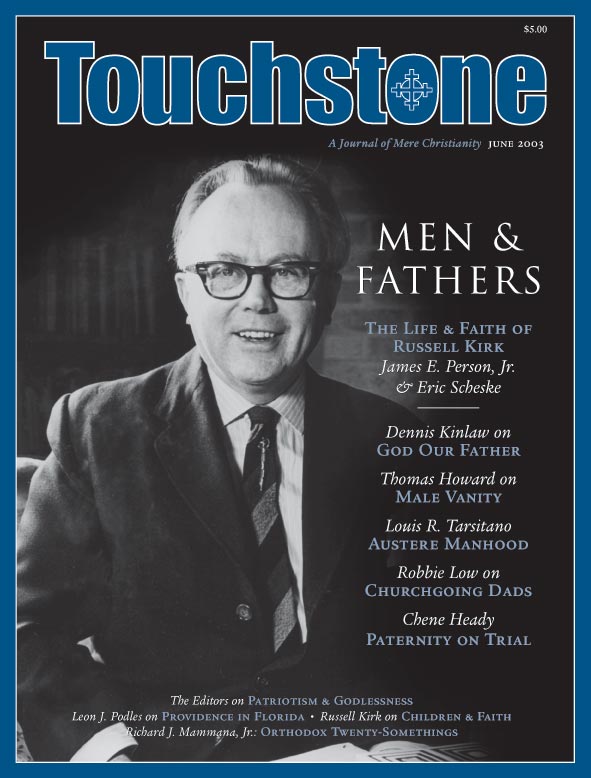Feature
Father’s Day in Court
Chene Heady on Paternity Suit Misfits
I began to suspect that it would be an odd Father’s Day when I had trouble locating an ordinary “To Father (From a Distance)” card at the Bloomington Factory Card Outlet. Scores of cutting-edge Father’s Day cards celebrating the paternal virtues of “Mother,” “Uncle,” “Teacher,” and “Neighbor” obscured, and effectively hid, the conventional card I wanted. It seemed the greeting card companies had finally made our national debate over the nature of fatherhood part of the holiday itself.
My card was not yet in the mail and this issue had not yet passed from my mind when, the week before Father’s Day, I was drafted into the jury pool for a paternity case. For once, my premonitions had proved correct. It was going to be an odd Father’s Day.
In the courtroom, I kept myself awake by envisioning the jury selection process as a social allegory. Each team of lawyers was going to use an exhaustive battery of questions to test potential jurors and would likely dismiss many of them as objectionable. The remainder would comprise the six-member jury and would be granted the authority to determine a father’s fatherhood and a child’s paternity. In television terms, the court was going to determine which Americans were fit to define fatherhood, by means of a Survivor-style competitive game show.
The Survivor analogy has its limitations (notably, the authorities vote off the contestants, and most contestants play with the intent of being voted off ), but at a basic level it holds: The hosts give the participants a series of challenges, and based on how well they perform these challenges and how much they ingratiate themselves, they either remain or are cast off. The show promised to prove interesting, and in societal terms the stakes were high. The contestants for this season were: (1) Tammy, an opinionated 40-year-old stay-at-home mom; (2) George, a 35-year-old minister with close-cropped, conservative hair; (3) Rachel, a 25-year-old research chemist; (4) Lucy, a regal-looking 63-year-old marriage counselor; (5) Eddie, a bearded 32-year-old bicycle repairman who loves National Public Radio (NPR); (6) Bob, a balding 40-year-old warehouse employee, who was eliminated out of the gate when he admitted he had recently been a paternity case defendant; (7) Kathy, a middle-aged working mother; (8–9) Maureen and Kelly, rather indecisive, middle-aged white-collar workers; (10) Rebecca, a youngish stay-at-home mom who has kept her maiden name; and (11–12) Mary, a quiet, elderly woman, and myself, who together comprised the audience, since the attorneys happened to agree on a jury before they got to us.
The active contestants would face three difficult philosophical challenges.
Fluid Fatherhood
The first skill challenge was a test of mental flexibility. It was administered, as were all the key skill challenges, by the defense attorney. She was a tall, middle-aged brunette, with the hair and clothes of a flapper, and the voice of a bicycle horn.
She began: “Many people assume that if you caused a child to be born, it’s yours forever. You own it; you’re a parent. But nothing’s that simple, is it? Legally, ownership (and parenthood) can be temporary. For instance: If you leave your suit at a Laundromat for a week, it’s still yours. But what if you leave it there for a month? Or a year? Could you get angry at the Laundromat if after two years they resold it? No, of course not. So at some point, the suit ceased to be yours. Ownership and parenthood aren’t so simple after all, are they?”
Most of the jury pool just nodded sagely, but this challenge was too much for Tammy. “You can’t compare children to laundry. Children aren’t laundry,” she growled. The defense attorney’s face fell. I sympathized with Tammy. Her objection had the ring of classical logic. The laundry analogy was obviously invalid: Children, who possess inherent worth and immortal souls, are in no meaningful way analogous to laundry, which exists only for use and is inherently disposable. But the defense attorney distrusted Tammy’s straightforward and inflexible logic. Tammy lacked the mental openness and agility the contest required. She was quickly dismissed, and we were on to round two.
The second skill challenge was designed to test our deconstructive and linguistic prowess. The defense attorney posited that, “Simply causing a child to be born does not make you a ‘father.’ It takes more than that to make a father. A father is the person that you’ve bonded with more than anybody on earth. An uncle may really be the ‘father’ in your life. Or maybe it’s a sister. Or even a neighbor. Fatherhood is a bond. So if you don’t have a bond with your ‘sperm donor,’ how can he be your ‘father’? He can’t, can he?” she asked in an embarrassed manner, as if the answer were so painfully obvious that it was somewhat rude even to pose the question.
Most potential jurors seemed to agree. It has become bad manners to suggest that any word (even fatherhood ) has a primary, evident meaning. We’ve become used to deconstruction, and the lawyer had performed a standard deconstructive move. She had split a word’s primary and secondary definitions—in this case, “male biological parent” and “central caregiver”—against each other, so as to render the word’s meaning uncertain. In her logic, a male biological parent isn’t necessarily a father, since emotional “bonds” are so important to fatherhood; however, since emotional “bonds” are inherently subjective and unstable, their importance does nothing to clarify who necessarily is a father.
This deconstruction threw biology out the window, along with the rest of empirical science and one prospective juror. Rachel the chemist had been turning bright pink throughout the defense attorney’s speech. Shortly afterwards she blurted out, “As a scientist, I can say with some certainty that your sperm donor is your father.” She was dismissed, and did a little victory dance on her way to the door.
The Final Test
The third and final challenge was a test of the limits of our sympathy. As the defense attorney put it to us: “We’re going to be talking about some uncomfortable topics. Some very explicit topics. I’m not saying for certain, but this child was probably the product of an extramarital affair. As a juror, you need to remember that we all do unexpected things at different times and under different pressures. We can’t really say what anyone should do in any particular circumstance. If discussing adultery makes you uncomfortable, or if you think that adultery is always and only wrong and that adulterers are bad people, perhaps it’s best if you don’t serve on this jury.”
Of itself, this challenge was not too difficult. It is an American cultural habit to consider sympathy as antithetical to moral judgment and even meaningful disagreement. Walking a mile in another man’s shoes is no longer considered much of a feat; now, to be considered sympathetic, you must desire a while with another person’s will. On the face of it, this challenge was difficult only in that it asked us to sympathize with a particularly unsympathetic case, the adulterer who had not, to our knowledge, been mistreated by his spouse. The genius of this test lay in how it completed our philosophical triathlon.
To pass the first test (The Abandoned Laundry), one must accept the fallacy of argument by analogy in a pretty weak form. One must have no faith in or knowledge of abstract logic as such. Plato and Descartes would be sent packing. To pass the second test (The Fatherly Neighbor), one must abandon empiricism—the most common philosophical resort of those who reject abstract logic—and instead accept the deconstructive doctrines that everything is language, and language is without stable meaning. Here we would lose famous agnostics like T. H. Huxley and Charles Darwin.
To pass the final test, one must abandon any sense of innate moral rights and wrongs, along with any concept of inherent duty, and accept an entirely situational ethic. Many great thinkers who have distrusted both abstract philosophizing and empiricism have coped by stoically willing to behave morally in the face of a seemingly meaningless world. Though their definitions of morality vary, here we would lose Immanuel Kant, Marcus Aurelius, and George Eliot.
And along with them we lost Rebecca. She was young, she had kept her maiden name, and she was painfully careful to identify herself as a modern woman. But to imply that it wouldn’t necessarily be wrong for her husband to commit adultery was a little more than she could bear, and she was quietly led away.
As I sat in the back of the courtroom and speculated about whether I’d ever be brought up for questioning, I found myself wondering who exactly could survive such a triathlon. Among philosophers, I could think only of Nietzsche and his poststructuralist disciples. The rejection of the empirical may have been too extreme for Freud, the rejection of the moral too extreme for Marx. Even in conservative Indiana, it seems, fatherhood is legally assumed to be a construct in the void, and only those who can exist in the void—without the guidance of logic, empiricism, or morality—are fit to define it.
Uncertain Fathers
Speaking of which, it’s time to announce our winners. The jury was finally comprised of Eddie, the NPR fan; Lucy, the marriage counselor; Kathy, Maureen, and Kelly, three middle-aged women whose metaphysical uncertainty seemed to reflect a generally uncertain cast of mind rather than a considered philosophical position; and George, the minister.
The jury selection process ended as allegorically as it had begun. The jury reflected quite exactly the combination of indecision and indoctrination that has made America unsure what a father is, and its deliberations seemed destined to add to this uncertainty. Small wonder, I thought, that there’s a national problem with fathers uncertain of or unwilling to accept their identity as fathers, a problem that causes, among other things, rashes of paternity suits.
The deconstructive philosophy of postmodernism has broken down our traditional notions of the rights and responsibilities of fatherhood, and of its very nature this philosophy can construct nothing better or worse to fill their place. The hole in the social fabric remains unpatched. As I sent off my Father’s Day card, I imagined the child whose birth had triggered this suit taking my place at the Factory Card Outlet on some Father’s Day down the road. He walks between the rows of cards marked “Mother,” “Uncle,” “Sister,” and “Neighbor,” restlessly searching, like the Athenians of Paul’s time, for the one truly appropriate card, the one marked “Other” or “Unknown.”
Chene Heady is a doctoral candidate in English Literature at the Ohio State University. He is currently working on a dissertation on the autobiographies of John Henry Newman, G. K. Chesterton, and other Victorian and Edwardian sages. His essays have appeared in the Southwest Review, New Oxford Review, and other periodicals.
subscription options
Order
Print/Online Subscription

Get six issues (one year) of Touchstone PLUS full online access including pdf downloads for only $39.95. That's only $3.34 per month!
Order
Online Only
Subscription

Get a one-year full-access subscription to the Touchstone online archives for only $19.95. That's only $1.66 per month!
bulk subscriptions
Order Touchstone subscriptions in bulk and save $10 per sub! Each subscription includes 6 issues of Touchstone plus full online access to touchstonemag.com—including archives, videos, and pdf downloads of recent issues for only $29.95 each! Great for churches or study groups.
Transactions will be processed on a secure server.
more on fatherhood from the online archives
more from the online archives

24.6—Nov/Dec 2011
Liberty, Conscience & Autonomy
How the Culture War of the Roaring Twenties Set the Stage for Today’s Catholic & Evangelical Alliance by Barry Hankins
calling all readers
Please Donate
"There are magazines worth reading but few worth saving . . . Touchstone is just such a magazine."
—Alice von Hildebrand
"Here we do not concede one square millimeter of territory to falsehood, folly, contemporary sentimentality, or fashion. We speak the truth, and let God be our judge. . . . Touchstone is the one committedly Christian conservative journal."
—Anthony Esolen, Touchstone senior editor











